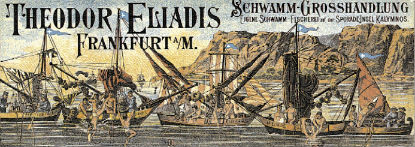
A two-hour lecture on Wednesday afternoon January, 29
repeated the next morning Thursday January, 30
Lecturer Vera Pratikaki
How a small and remote island of the Dodecanese connected places on an economic, intellectual and cultural level through its sponge-industry; how Kalymnos through its sponge-industry was able to enrich its culture, extend its own local limits and become part of a wider, more globalized world.
Brief Description / Focus
The focus of this presentation is from the end of the 19th century to the mid-20th century. Despite the fact that sponge-fishing was an ancient practice, until the 19th century the role of Kalymnos was limited. However, two factors brought about radical change: the rapid increase of demand for sponges (following the industrial revolution) and the introduction of a new fishing method (i.e. the ‘skafandro’).
The presentation will focus on the role of the people of Kalymnos, since it was them, who controlled 70% of the global sponge trade.
Theoretical Approach
This work is best understood as a combination of global history and microhistory. It shares the fundamental belief of global historians, namely that the study of connections and comparisons is essential for the writing of history. Moreover, it emphasizes the need for changing the historian’s optic from ‘telescope to microscope’, so that a phenomenon can be studied with more intensity.
https://www.apan.gr/en/component/k2/item/1042-the-role-of-kalymnos-in-global-history-a-century-ago#sigProIdf938c7afcf




